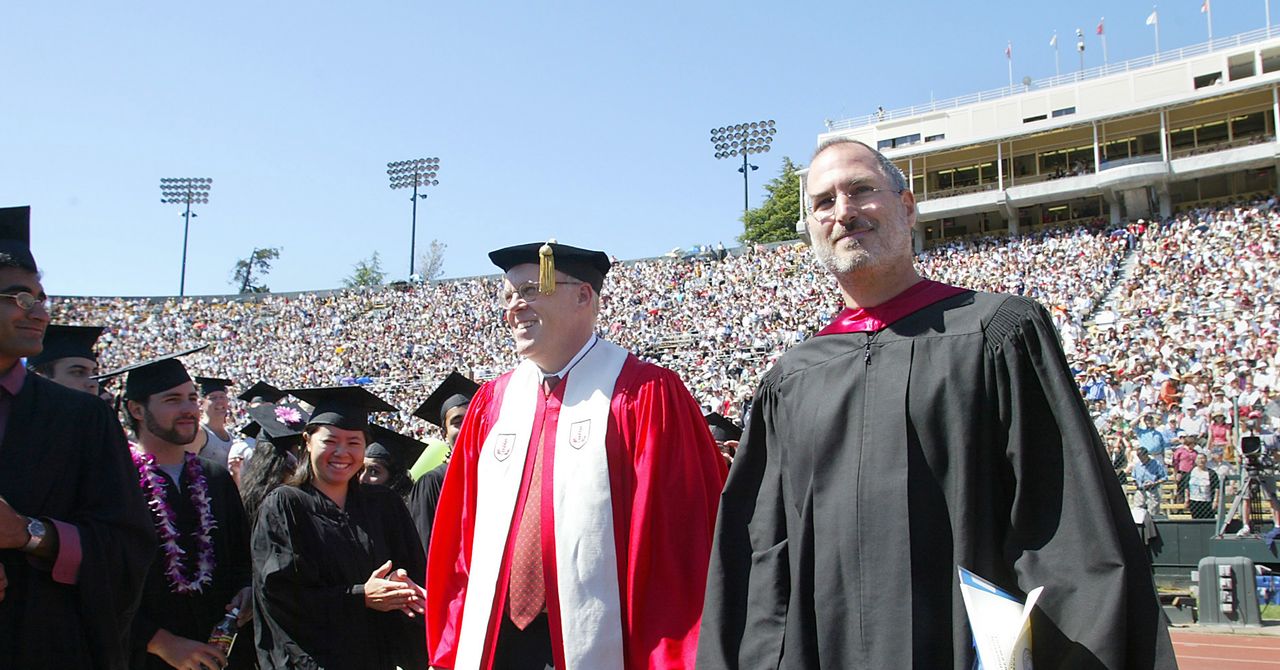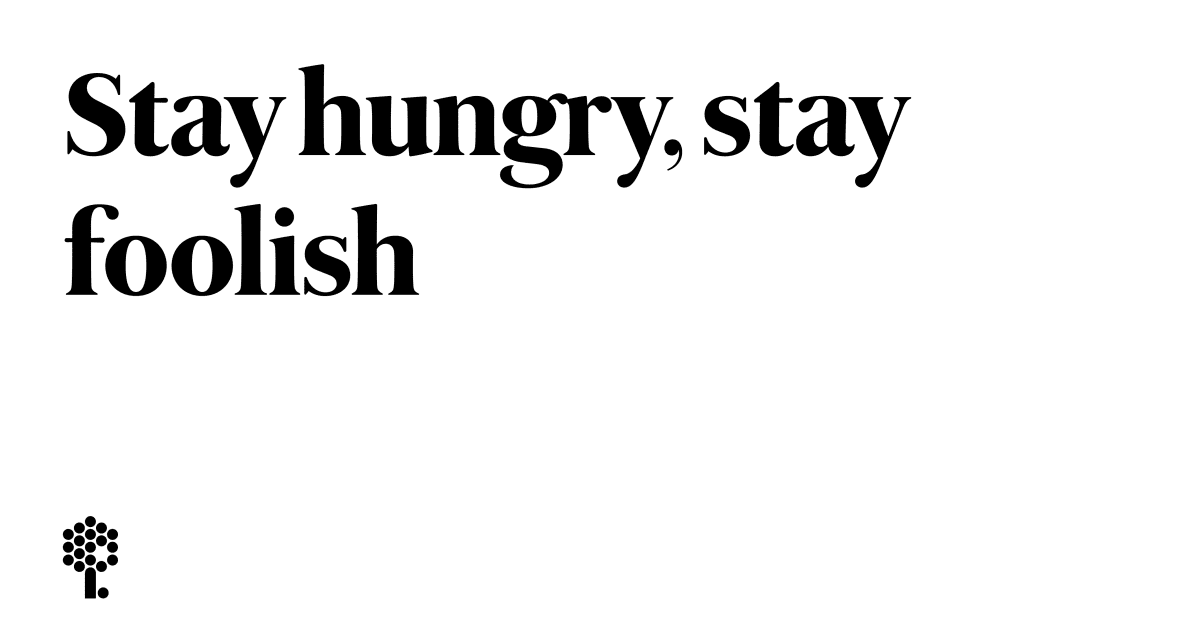Hungry. Foolish.

If you're looking for something to read today, this is it. While the Steve Jobs Archive has a beautiful (as always) commemoration on the 20th anniversary of Jobs famous commencement speech, Levy dives into the background of how it came to be – and how it almost didn't.
Jobs actually wasn’t the graduating class’s top choice. The four senior copresidents polled the class, and number one on the list was comedian Jon Stewart. The class presidents submitted their choices to a larger committee, including alumni and school administrators. One of the copresidents, Spencer Porter, lobbied hard for Jobs. “Apple Computer was big, and my dad worked for Pixar at the time, so it was the obvious thing that I represent the case for him,” Porter says. Indeed, legend has it that Porter was the inspiration for Luxo Jr., the subject of Pixar’s first short film and later its mascot. When his dad, Tom Porter, brought Spencer to work one day, the story goes, Pixar auteur John Lasseter became entranced by the toddler’s dimensions relative to his father’s and got the idea for a baby lamp. In any case, Stanford’s president, John Hennessy, liked the Jobs option best and made the request.
By this point Jobs had declined many such invitations. But he’d turned 50 and was feeling optimistic about recovering from cancer. Stanford was close to his house, so no travel was required. Also, as he told his biographer Walter Isaacson, he figured he’d get an honorary degree out of the experience. He accepted.
The one wrinkle in Jobs' plan, as Levy notes: Stanford doesn't give out honorary degrees. Thankfully, Jobs did not know that. As he started to put the speech together – in notes he would email to himself, as he so often did, which the Archive posted! – Jobs was struggling with it.
Flailing a bit, he reached out for help from Aaron Sorkin, a master of dialog and an Apple fan, and Sorkin agreed. “That was in February, and I heard nothing,” Jobs told Isaacson. “I finally get him on the phone and he keeps saying ‘Yeah,’ but … he never sent me anything.”
One day at Pixar, Jobs ran into Tom Porter. As Spencer Porter says it, Jobs asked Tom if his son could send over a few pointers. The students sent Jobs some thoughts. Hennessy told him to forget abstract advice and make the speech personal.
While I read the Isaacson book, I totally forgot the bit that Jobs had reached out to Sorkin – and Sorkin ghosted him! Sorkin, of course, would go on to write the screenplay for the movie based on Isaacson's book! (Which is now itself a decade old and I think actually has aged fairly well. Though I still wish Christian Bale would have been cast as Jobs as I think he both looks more like Jobs and in general is more of a chameleon – I mean, have you seen him as Al Davis?!)
But the real key to the whole thing may have been:
Eventually, Jobs recruited his old friend Michael Hawley to help him out. Hawley was a polymath associated with the MIT Media Lab. A brilliant technologist, he was once a cowinner of a worldwide piano competition for “outstanding amateurs,” and he later organized a TED-like conference called EG. Hawley had worked with Jobs at Next and even shared a house with him at the time. They had kept in close touch.
Hawley’s contribution to the speech has been somewhat of an open secret for years. Still, there is no mention of him in Becoming Steve Jobs, by Brent Schlender and Rick Tetzeli, which devoted a chapter to the speech. The Isaacson biography doesn't cite him and neither does, surprisingly, the exhibit at the Steve Jobs Archive. In an online Festschrift for Hawley in April 2020, Jobs’ son Reed spoke about Hawley’s role, including the “don’t puke” email quoted above. But Hawley never spoke publicly about exactly how he helped Jobs—except for one day in 2020, while driving around Boston with the journalist John Markoff a few months before Hawley’s death at age 58 from cancer. Markoff recorded the conversation, none of which has been made public until now.
As Hawley recounted to Markoff, Jobs first tried to get him to deliver the address. “He told me he was hoodwinked, as he put it, into giving a speech at Stanford and just didn’t know what to say or do,” Hawley said. “He wanted to turn it down, he wanted to get me to do it instead. I said, ‘No way—it’s your gift.’ He then basically begged me, in a very sweet way, a very Steve way, to help him out. And I said sure.”
Jobs would go on to work with Hawley to whip the speech into shape, stopping only to prepare for – what else – WWDC that year.
The archive exhibit contains eight emails that Jobs sent himself. There’s a gap between early May and June; presumably, Jobs was preparing for a more familiar sort of presentation at that time: his opening keynote at the Apple Worldwide Developers Conference on June 6. Onstage in San Francisco that day, Jobs was masterful, stalking the stage in alpha fashion, explaining a new phenomenon called podcasting (“We see it as the hottest thing going in radio”) and the Macintosh’s switch from PowerPC to Intel processors. But the Stanford deadline was looming. By June 7, he was back to sending emails to himself. Hawley told him that, just like an undergraduate, he might have to pull an all-nighter to finish the speech.
While Jobs nailed that keynote, as always, the other one was clearly still weighing on him right up until the moment he gave it.
Though he almost certainly practiced the 15-minute speech enough to memorize it—in his keynotes he would speak articulately without notes for an hour—he opted here to read from his printed sheets of paper. This was no Stevenote. The audience was unfamiliar. The venue was uncomfortable. He was in a weird robe, not his beloved Issey Miyake turtleneck.
When he spoke, his voice was steady, but it lacked his typical authority and verve. “He was a little gimpy at the podium,” Hawley told Markoff. “It was one of the few times he was vulnerable in public. That worked out well for him.”
He was far less in command than he so often was (even from a young age). But that's exactly why the speech worked. His style matched the message. But that was really only apparent after the fact, because it was so hot at Stanford that day. Thank god for YouTube:
The initial applause from the students was modest. At his keynotes, Jobs was used to a more thunderous response when announcing, say, a new OS feature or how many iPods sold in the past year. After a few seconds, though, some students stood, seemingly more out of respect than jubilation. Most others followed suit. It isn’t clear that the speaker noticed. He simply looked relieved. “Steve wasn't so sure it went well as we headed out of the stadium,” Hennessy says. “But I assured him it had.” Jobs returned home with his family, glad the episode was over.
It was only the beginning.
At that point in time, YouTube was only months old, Twitter didn’t exist, and Facebook didn’t even have its news feed. The national media hadn’t covered the speech. Apple sent out no press releases. But Stanford published the transcript on its primitive website, and people began discovering it. I recently checked my inbox for June 2005 and found multiple copies sent to me from different mailing lists. As the weeks and months went by, more and more people found the speech. Berlin describes it as going “slow-motion viral.”
As Levy notes, the speech has now been viewed over 120 million times.
Anyone replaying his speech today knows how much he accomplished in his 56 years. As much as any public figure in our time, Jobs lived according to the advice he offered the students that day. He pursued what he loved and refused to lead anyone else’s life, and the result can be measured in his legendary products. But as life-changing as his gadgets were, none strike the heart and soul as intimately as the Stanford speech. Random example: In 2016, after the Cleveland Cavaliers lost the first two games of the NBA finals, LeBron James played the speech for the disheartened squad in the locker room. It galvanized the team. Kevin Love wrote “stay hungry, stay foolish” on his sneakers. Four games later, James hoisted the championship trophy.
As a native Clevelander, and a friend of Levy's, I want to believe he included this bit just to bait me into sharing it. That remains the only championship Cleveland has won – in any major sport – since the 1964 NFL Championship. With Jim Brown. The Super Bowl didn't even exist yet. Cleveland has never even been to a Super Bowl, let alone won it. But I digress...
I thank Steve Jobs for his speech's role in saving a city. And inspiring literally millions and millions of people, even those now born after he passed away, who have stayed hungry and foolish, as Stewart Brand wanted.



